Black entrepreneurs changing business landscape in Region
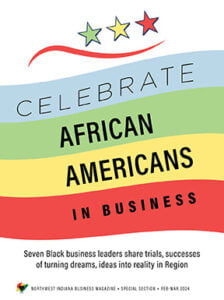
Small businesses are the economic engines of local and national communities.
They create jobs and foster strong, vibrant connections between stakeholders.
Of the 534,640 small businesses in Indiana, 37,538 are owned by African Americans, according to the Small Business Administration office of advocacy.
Indiana ranks 26th out of 40 states for minority business ownership, according to a 2021 Brookings report.
However, Black business ownership is on the rise. That is good news for communities across the country and in the Region.
“Diverse business ownership does indeed benefit the entire Region,” said Jokima Hiller, assistant professor at the Indiana University Northwest School of Business and Economics.
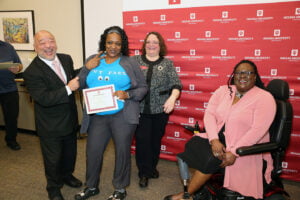
Minority business owners are a key piece of the economic puzzle. They help create a rich socioeconomic tapestry and are a powerful force for spurring growth and change. However, Black-owned businesses only make up 3% of all U.S. businesses, according to a Pew Research Center analysis of U.S. Census Bureau data.
Last year’s economic statistics also show an increase in families migrating to Northwest Indiana, according to Hiller. Diversification in our business offerings will become inevitable, she said.
However, that needle is moving slowly. If Black business ownership continues to grow at its current rate of 4.72%, it will take 256 years to reach parity with the share of Black people in America, according to the Brookings Institution.
“By showing the leadership talent within our community, diverse business ownership can be an aspiration and inspiration for the next generation of Black professionals and the future of our children,” Hiller said.
The following seven individuals are changing those numbers and serving as mentors. They represent just a few of the African American entrepreneurs in the Region. Here are their stories:
 Lois Whittaker
Lois Whittaker
Black Chamber of Commerce of Northwest Indiana
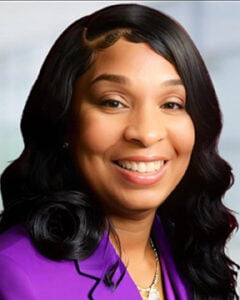
Lois Whittaker is an entrepreneur who started a business to help other like-minded people. Her story comes full circle.
She is the founder and president of the Black Chamber of Commerce of Northwest Indiana in Gary. The organization aims to empower and sustain African American communities in the Region through entrepreneurship.
Whittaker is no stranger to business ownership. She founded a medical billing and coding school, a real estate company and the nonprofit chamber of commerce.
Whittaker faced many obstacles in her business journey.
“What I realized is that minorities suffer a different type of challenge,” Whittaker said. “It’s more difficult to get loans to start a business. We aren’t usually generational business owners having learned some of those mistakes from our parents. A lot of business entrepreneurs, like myself, are first generation, so we are in an active learning stage.”
Whittaker also noticed there were limited networking opportunities and skill development programs specifically for Black entrepreneurs. She wanted to create an organization to bridge that gap.
The Black Chamber of Commerce of Northwest Indiana offers guidance to address the specific needs of Black entrepreneurs. They provide entrepreneurship, business accelerator and workplace readiness programs for youth and adults. Their regular meetings feature guest speakers, industry experts and community leaders. The meetings are an opportunity for members to connect, support and learn from each other.
Whittaker knows firsthand that the path to running your own business isn’t easy, but she helps others to meet that challenge.
“If you’re intimidated, that’s great,” she said. “That’s going to force you either to quit or, on flip side, encourage you to step up your game. To learn. To watch. To think.”
To Whittaker, the diverse business owner could have the next million-dollar idea.
“We don’t know who has the next problem-solving idea,” Whittaker said. “That’s what entrepreneurs are. We are community problem-solvers.”
Entrepreneurs are role models in the community. Whittaker’s organization works to build and shape more role models.
“I am a person of solutions,” she said. “I help communities.”
 Joshua Avila
Joshua Avila
Novos and Nex Marketing
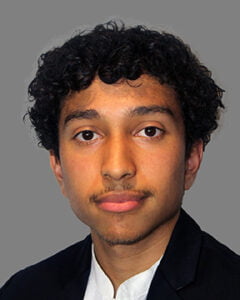
Joshua Avila started his first business when he was in eighth grade. He made custom T-shirts that sold out fast.
Today Avila is the CEO of Novos and founder of NexMarketing in Highland — and he just graduated from Munster High School.
In 2023, Avila won third place in the Innovate WithIN competition, along with his business partners Austin Beetson and Sayeed Mohammed. Innovate WithIN is a yearlong entrepreneurship program for Indiana high school students. It culminates in a statewide pitch competition.
The trio won their first sales pitch and received $2,500 in seed money for their business. Their company, Novos, sold kits of blends of essential oils inspired by different cultures.
“I always loved business. Business was always my home,” Avila said. “I wanted my passion to be able to pay for itself.”
Avila worked to make their business concept come to life. He learned how to run a business, how to work with factories and how to bridge language gaps when communicating with companies overseas. He also has honed his professional image.
Avila later founded Nex Marketing with Mohammed. The company creates social media content for small businesses. Avila described the business as “blowing up” and going places he hadn’t expected. One of Avila’s biggest challenges in proving his business acumen is something he can’t control — his age.
“It’s actually a blessing in disguise though,” he said. “Because we’re the people who grew up with social media.”
For Avila, success came from finding what he was passionate about doing and building on that idea.
“Finding yourself is the most important thing,” he said. “It’s like breathing. If you want it, treat it like breathing.”
As a young, successful entrepreneur, Avila is sometimes asked to give speeches at schools.
“Some kids don’t listen. Some kids you see a spark in their eyes. And some kids ask a million questions,” he said.
Avila was in their shoes not that long ago. “I’m the first entrepreneur in the family,” he said. “It’s the drive of wanting more and reaching a goal no one else had reached.”
 Charita Lucas
Charita Lucas
Future Cycle Breakers and dOSA Naturals
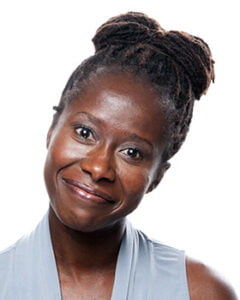
Charita Lucas knows what it means to break the cycle of generational poverty.
Lucas, founder of Valparaiso-based dOSA Naturals and Future Cycle Breakers, grew up in Cabrini-Green, an infamous housing project in Chicago. Later she moved to Englewood, a neighborhood consistently ranked among the most dangerous in Chicago. Her parents were teenagers.
“We didn’t have a lot,” she said. “We learned to live simply.”
Lucas describes her life as “zig zaggy” having overcome her personal challenges to make a career for herself in global advertising. She spent 30 years climbing the ranks and was the only Black female in networking and infrastructure at her job.
“I was the representation,” Lucas said. “It was a lot of pressure.”
After several decades, Lucas shifted gears.
“I’ve done what a lot of kids who look like me want to do,” she said. “I climbed the hill, made it to the top and I wanted to do something more substantial.”
In 2019, Lucas and her two sisters, Charlotte Purnell and Audrella Morales, founded Future Cycle Breakers. They wanted to help others do what they did: break the cycle. Their nonprofit is focused on educating future African American entrepreneurs.
“It’s not that they don’t have the intelligence,” Lucas said. “They don’t have access to the resources. When you level the playing field, that’s when you start to see the cycle breaking.”
Future Cycle Breakers runs entrepreneur programs and leadership camps. Students are connected to a network of mental health and legal advisers, mentors and marketing experts — a network built up from Lucas’ years in advertising.
“When we make connections with each other, we become real people,” Lucas said. “It’s important to surround yourself with people who really believe in you and who see you as you don’t even see yourself.”
The three sisters also run dOSA Naturals, a company named for their great, great grandmother Dosa McGee. Their company sells an organic line of skin care products. Products are ethically sourced, simple and sustainable. The dOSA Naturals website also features products made by KidPreneurs. One entrepreneur is only 8 years old. She sells Adorabows, headbands and bows designed to make people feel good about their hair.
“We are building an infinity cycle,” Lucas said. “The kids in the program give back a certain portion of their sales to their communities. They’re not just entrepreneurs, they’re community builders.”
 Faith Spencer
Faith Spencer
IronWorkz
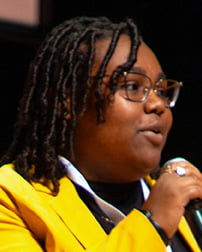
The name of Faith Spencer’s business stems from the steel roots of her hometown of Gary.
Spencer’s grandparents worked in the steel mills. Families migrated from the South to Gary looking to build new lives. To them, the city represented hope. Spencer wanted her company, IronWorkz, to reflect those concepts.
“We want the city of Gary to come back as strong as it should on a new wave,” Spencer said. “If we work together and unite together, there’s no reason the city should continue to struggle as it is.”
Gary is the largest city by population in Lake County, but only accounts for 9% of all businesses.
In December 2022, Spencer, Alex Termini and Emmani Ellis founded IronWorkz. Their company helps connect the city’s residents to tools and resources to help them on their paths to business ownership.
“It can really become something if you are equipped with the right tools and you have access,” Spencer said.
Spencer started her first company, Rearview, when she was in high school. Rearview is a device that alerts cyclists when something is approaching from behind them.
Spencer’s love of entrepreneurship started young. Her father owned an auto repair business. She grew up in the office, watching him talk to customers and learning about business ownership.
“It was ingrained in me,” she said. “It’s what I grew up around, and it fueled me to do something similar.”
Spencer has worked hard to overcome obstacles.
“There are going to be people who don’t like you because of the color of your skin. You have to mitigate that and dance around it,” Spencer said. “I see people trying to make change, and change is good. But change should be meaningful. Don’t just take the bus.”
In 2023, Spencer’s company offered workshops that were attended by people from ages 9 to 73. The classes covered Gary’s history, the history of Black wealth in America, mindset and entrepreneurship. They offered opportunities for building knowledge, networking and building relationships.
“In order for the younger generation to take the torch, we have to learn from the older generation,” Spencer said. “When we’re actively engaged and learning from each other, it makes the world spin a whole lot better.”
Spencer envisions IronWorkz as an innovative powerhouse in the community.
“We take challenges and turn them into accomplishments,” Spencer said.
 Jeremie Lander
Jeremie Lander
Better Finance Today
Jeremie Lander likes the common saying: “Never judge a book by its cover.”

And he is a good example. At age 20, he is the founder of four Merrillville-based companies.
“People often overlook me because I’m young and African American,” he said. “I have to prove myself to every single person every single time.”
Lander started a construction company when he was 14. He also owns an indoor billboarding company, a private equity investing firm and a financial education business. Lander quickly learned how to run a business. Part of that education was gaining enough knowledge about finances to keep his businesses afloat.
“When I talked to others about finances, I learned it’s not common knowledge,” Lander said. “People are afraid to talk about money.”
To help break that stigma, Lander founded the company Better Finance Today. His goal is to build a community of financial literacy. He calls his company a one-stop shop.
Better Finance Today is an online financial literacy program. The website features podcasts, courses, reading materials and a group chat led by entrepreneurs. Lander is the author of two books. One book is geared toward high school-aged readers. The other book is more advanced.
“It’s about finding the right financial information and giving everyone a chance to learn,” Lander said.
Lander hopes to create a safe space for people to feel comfortable talking about finances. His passion for financial education is driven by the struggles his family faced with their financial situation.
“I didn’t have any real Black role models in this field,” he said. “I decided I’ve got to be my own role model, so I can be a role model for others.”
Lander’s path hasn’t always been easy, but he didn’t quit.
“There’s always light at the end of the tunnel,” he said. “You just have to travel through the tunnel.”
Through Better Finance Today, Lander hopes to empower individuals and remove barriers to financial education.
“Being able to give back and help is my biggest accomplishment,” Lander said.
 Brianna Hairlson
Brianna Hairlson
Bri’s Dance Place
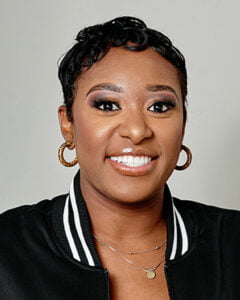
Brianna Hairlson, founder of Bri’s Dance Place in Merrillville, opened her studio in October 2019. Five months later, the pandemic hit.
Hairlson’s tenacity helped her weather the crisis. Now her business is thriving.
She teaches ballet, tap, hip hop, modern dance and a nationally recognized dance class for expecting mothers. But Bri’s Dance Place has always been about more than running a business and teaching students to dance.
“We use dance as a vehicle to teach about life,” she said.
Hairlson talks with her students about friendship, joy and perseverance. Her studio is for all ages, stages and abilities.
A Merrillville native, Hairlson took a dance class at church when she was 7 years old. She fell in love, but her mother discouraged her from going into dance full time. Hairlson graduated from Howard University in Washington, D.C., with a bachelor’s degree in business administration and a minor in dance. Her mother’s advice paid off.
“I found out I have a knack for business,” Hairlson said.
Hairlson took classes and taught at the Dance Institute of Washington in Washington, D.C. Sasha Obama was one of her students. There, Hairlson saw beautiful dance studios and was exposed to the arts.
“I knew I wanted to bring that same experience back to Northwest Indiana,” she said.
Hairlson returned to Merrillville and began working as a consultant for IBM. At the same time, she volunteered as a dance instructor. After being laid off by IBM, she enrolled in a program for entrepreneurs and laid the groundwork for opening her own studio.
But when Hairlson went to a town meeting for zoning approval for her studio, she was set back by preconceived notions about a youth program and African Americans. Her business was placed on a six-month probation.
“It was disheartening, but I moved on,” Hairlson said.
Bri’s Dance Studio started small. Now it’s so busy that Hairlson will expand the studio this year.
“Don’t despise small beginnings,” she said. “Everything has to start in a seed form. You feed and water it, and watch it grow.”
Hairlson sees her business as a pathway to building a strong community. She runs a special needs program, does dance therapy and partners with local schools to provide arts education. Hairlson also gives other aspiring business owners in the community a boost.
“Entrepreneurship is a way to give back,” she said.
Hairlson’s business also has distributed $25,000 in grants and scholarships to students and female entrepreneurs. Her first book, “Dance Through the Storms,” offers reflections on her life.
 Michael Tolbert
Michael Tolbert
Tolbert & Tolbert LLC
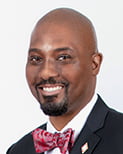
Michael Tolbert and his wife, Shelice, met in junior high. That’s when their dream of opening a law firm began.
“From the time we were 11 or 12, we always said we’d go to law school and open up a firm in our hometown.”
In January 2015, they did just that. They are the founders of Tolbert & Tolbert in Gary.
“Our inspiration was to give back to our community,” Michael Tolbert said. “We wanted something our community could be proud of.”
Tolbert & Tolbert’s mission is to render compassionate legal services. The faith-based law firm aims to provide the best, most affordable legal services to businesses and individuals.
“When you think of a lawyer, you don’t always think of Christ,” Tolbert said.
Tolbert’s father, an ironworker in Gary for 30 years, was a strong influence in Tolbert’s decision to open a legal firm.
“He always said it is important for us, as African Americans, to own and to give back and to open up businesses in our communities,” Tolbert said.
Growing up, Tolbert read everything he could about Reginald Lewis, the first African American billionaire. He drew inspiration from Lewis’ story and business acumen.
A graduate of Valparaiso University School of Law, Tolbert and his firm have received multiple accolades. The distinctions Tolbert has received, along with his community service, could fill a book. Tolbert’s success has not been without obstacles. One difficulty has been encouraging people to look at minority-owned businesses the same way that they look at their counterparts.
“People view African American businesses as the minor leagues,” Tolbert said. “That couldn’t be farther from the truth.”
Despite challenges along the way, the Tolberts have built a thriving law firm, based on their principles of faith and their belief in uplifting and empowering the Gary community. Tolbert said successes almost always occur after the lowest points. He likened it to mining for diamonds.
“People quit too early sometimes,” Tolbert said. “Keep digging. You never know when that last shovel or last pick will reveal a diamond and change your life.”
Read more stories from the current issue of Northwest Indiana Business Magazine.

